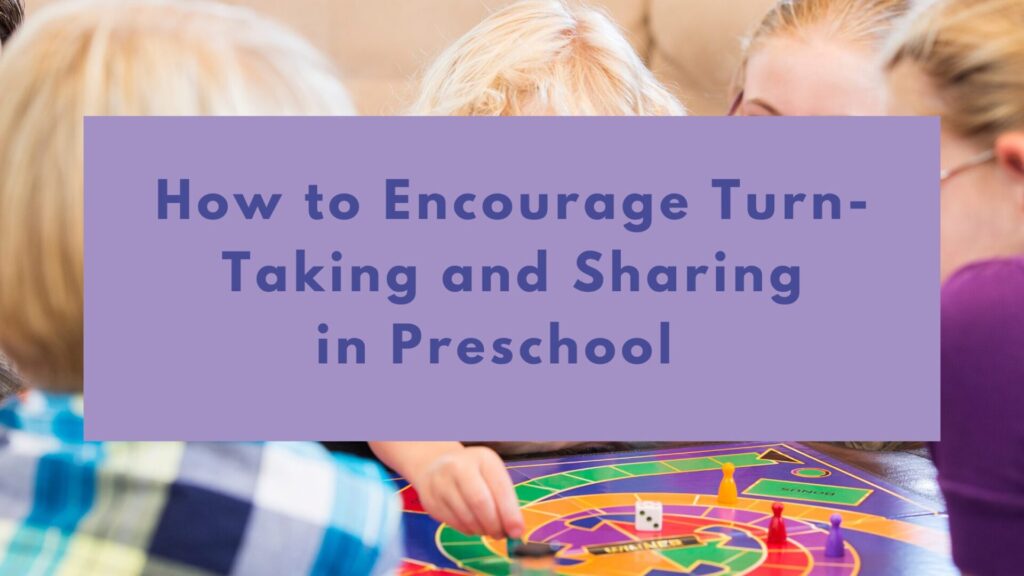
Parents and teachers regularly throw around the phrases, “share your toys” and “wait your turn” with their little ones. But, they often feel frustrated when their children aren’t following through with their requests. The thing is…your preschoolers aren’t being “stubborn,” on purpose. In fact, they may not be ready, based on age or development, to do either skill yet. As with many other important early childhood life skills, getting on board takes time and practice. Today, I’ll share tips for encouraging turn-taking and sharing in preschool to make playtime a more positive experience for everyone.
Please note: This post may contain affiliate links. As an Amazon Associate, I earn from qualifying purchases. Therefore, if you buy something through these links I will receive a small commission at no extra cost to you. Thank you for your support.
When Does Sharing Start?
Being asked to share one’s possessions isn’t always easy, especially for young children. Zero to Three states, “Many parents have unrealistic expectations about when children learn to share, with over 43% of parents believing the skill could be mastered before the age of 2.”
This is concerning because children aren’t developmentally ready until much later. Understanding the natural progression of skills and the stages of play development in early childhood can help parents know what to expect and when.
Between the ages of 2 and 3, toddlers’ play skills are still emerging. They generally engage in parallel play with their peers. So there isn’t too much interactive play where turn-taking can naturally occur. However, with adult guidance and support, they can begin participating in simple turn-taking activities, like rolling a ball back and forth or completing an age-appropriate puzzle.
Slightly older children, between 3 and 4, start interacting more regularly with their peers. So, this is a great time to practice turn-taking. I recommend playing simple board games often.
Once a child is approximately 5 years old, they’ll begin sharing more easily. This is because they have practiced turn-taking, frequently engage in cooperative play, have more social awareness and empathy, can wait for extended periods, and have better language/communication skills.
Common Example of Sharing in Preschool
Forcing children to share, especially before they understand the concept or have the prerequisite skills, may result in more challenging behaviors, i.e. hitting and tantrums.
Just imagine…your little one is playing, happily, with their brand new toy when their younger sibling snatches it from their hand. He pushes his brother and they both start to cry. So you intervene and say, “You need to share your toy with your little brother.”
How do you think the child will feel at that moment? They’ll probably feel angry, frustrated, or even resentful. More than likely, they’ll resort to negative behaviors to release those feelings too.
Here’s what you can try instead…
First, start by validating the older child’s feelings. “You’re mad because your brother took your toy.” Return the toy to him and tell the younger sibling, “It looks like you want to use it too. He’s using it now.” Then give your youngest the option to choose a different toy. When they choose one praise them by saying, “Great choice. Let’s play with this until he’s done.”
After some time, ask the older child if you can all take turns with the original toy. Then praise that child if they agree. If they aren’t ready yet, move on and try again later.
Are there differences between turn-taking and sharing?
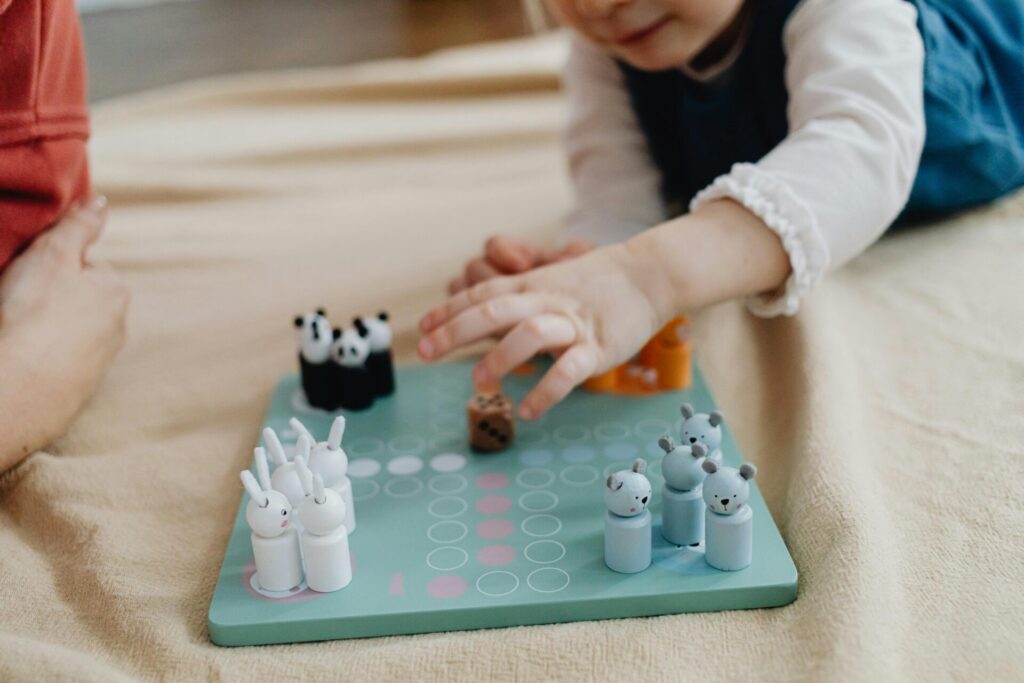
Turn-taking and sharing are crucial social-emotional skills in early childhood and throughout life. They encourage empathy, kindness, patience, collaboration, respect for others, and fairness. However, it’s important to understand the differences between the two and know that one skill occurs before the other.
As previously mentioned, turn-taking occurs at an earlier age because it doesn’t force the child to, fully, give up an item or action. Instead, it refers to waiting for one’s opportunity to use an object or engage in an activity/conversation with others. There is a clear back-and-forth dynamic, i.e. one person uses an item while the other waits and vice versa. Some examples are children alternating turns with a board game or waiting while someone else speaks to join a conversation.
Sharing is a bit more challenging. It differs from taking turns because the individual is expected to use an object at the same time as someone else, relinquishing full control. For example, children must use the same set of blocks to build separate structures in the classroom or cut their cake into equal slices to give to friends.
How to Encourage Turn-Taking and Sharing in Preschool
- Be Patient and Understanding: Having realistic expectations, based on your child’s age and development, is essential. Understanding that the skills needed for turn-taking and sharing take time and practice is half the battle. Give your child (and yourself,) some well-deserved, grace.
- Use Positive Reinforcement: Focus on the positives! Acknowledge and praise your child when they are patient, show signs of generosity and kindness, take turns, and share appropriately.
- Model Expected Behavior: Since children learn best by example, model positive behaviors in front of them throughout the day. For instance, let them see you when you share a snack with someone else, wait patiently in line at the store, and take turns during a conversation. Additionally, demonstrate these same behaviors when you’re playing with your child.
- Teach Communication and Problem-Solving Skills: You can start practicing turn-taking when your child is still an infant. One of my favorite ways to do this is with the “your turn, now my turn” method. When playing with toys collaboratively use simple language like, “It’s your turn to stack the block, now it’s my turn.” Similarly, children should be taught helpful phrases as they age like, “Can I use that when you’re done?” or “Can I have a turn too?” Knowing when to use these phrases can help minimize power struggles and help children navigate play situations with their peers. When conflicts arise, adults should guide children by encouraging them to come up with fair solutions.
- Establish Reasonable Expectations: It’s important to talk to your child about expectations for sharing or taking turns–particularly before a situation when they will be asked to do so. For example, my family visits a local swim club during the summer and our preschooler often brings a bucket of toys to play with in the water. He understands other children may see his toys and be interested in using them. Other children often pick up the toys without asking as they float by. Therefore, before going to the pool, I tell him, “If there’s a toy you’re unwilling to share, don’t bring it. Choose other toys instead.” This allows him to bring toys he’s comfortable sharing and minimizes the chances of conflict between the kids.
- Practice, Practice, Practice: Give your child plenty of opportunities to engage in games and activities that naturally require turn-taking, i.e. memory match, BINGO. These games can teach children when and how to take turns, making it easier to understand the concept over time. Additionally, when teaching a child to take turns, try incorporating a visual timer, gradually increasing their waiting periods. Simple social stories, explaining how sharing can help children learn empathy and build strong friendships, may also help foster generous behavior. Once children have had ample practice and understand the importance of taking turns and sharing, these skills will become more commonplace.
Games That Promote Turn-Taking and Sharing Skills in Preschool
Here are a few recommendations for turn-taking games. These are great for teaching social-emotional skills and early literacy and math concepts.
- Skill Level: Beginner
- Develops Critical Skills – Perfect For Pre-Readers And Early Readers, Builds Language And Matching Skills In Preschool Kids Through Fun, Fast-Paced Play Zingo Is As Popular In The Classroom With Teachers As It Is In The Home With Families
- What You Get - This Is The Newest Edition Of The World Famous Game Zingo, One Of Thinkfun'S Best Games For Kids Ages 4 And Up, And It Includes An Extra Zingo Card So That Up To 7 Players Can Play! Also Includes A Unique Zinger Device That Delights Players Of All Ages
- Clear Instructions – Easy To Learn With A Clear, High Quality Instruction Manual You Can Start Playing Right Away
- CLASSIC BEGINNER GAME: Do you remember playing Candy Land when you were a kid. Introduce new generations to this sweet kids' board game
- RACE TO THE CASTLE: Players encounter all kinds of "delicious" surprises as they move their cute gingerbread man pawn around the path in a race to the castle
- NO READING REQUIRED TO PLAY: For kids ages 3 and up, Candy Land can be a great game for kids who haven't learned how to read yet
- GREAT GAME FOR LITTLE ONES: The Candy Land board game features colored cards, sweet destinations, and fun illustrations that kids love
- Builds Memory Skills: Designed for kids ages 3 to 5, this toddler matching game helps improve focus, pattern recognition, and cognitive development.
- Easy Setup and Quick Play: Features simple instructions for quick learning, making it one of the easiest memory games for preschoolers and a favorite among boys and girls ages 3-5, 4-6, and 5-7.
- Unlock a world of fun learning: The Wonder Forge Disney Classic Characters Matching Game. Enchanting Disney themes delights kids ages 3-5. Develop critical focus & memory skills with this magical 72-tile card game with Mickey, Minnie, and Friends.
- Family Fun for All Ages: Ideal for family game nights, this card game encourages interactive play for children promoting memorization, cooperation and focus.
- Great Gift for Any Occasion: Perfect as a birthday gift for girls or boys ages 3 to 5, for Christmas, Easter, or just because.
- Learn numbers 0 to 20
- Unique, six-way format adapts to a variety of skill levels
- Set includes: 36 playing cards, over 200 chips, caller's mat and cards, and a sturdy storage box
- Ideal for teaching: Pre-Kindergarten to 2nd Grade (Ages 4 to 7)
- Wooden magnetic fishing game that builds confidence while it entertains
- Catch the fish with the magnetic "hook"
- Includes 2 working wind-up rods and reels
- Use as a 2-player game or solo activity; great for hand-eye coordination, fine motor skills, problem-solving, and interpersonal skills
- Makes a great gift for preschoolers, ages 3 to 5, for hands-on, screen-free play; this product ships in its own special e-commerce packaging intended to be easier to open and reduce waste (curbside recyclable)
Conclusion
Turn-taking and sharing are crucial life skills that can promote positive interactions and relationships during childhood and adulthood. Therefore, adults should encourage these skills, in their little ones, with age-appropriate expectations, patience, and practice.
Now talk to me! What are your favorite games or activities for encouraging turn-taking and sharing in preschool? Please share them in the comments below.
SAVE TO PINTEREST


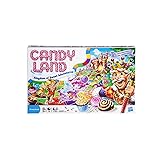
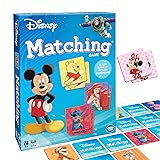

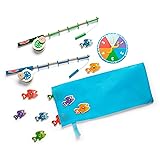



Great blog with practical tips on fostering turn-taking and sharing in preschoolers! These skills are crucial for social development and future success. Valuable advice for parents and educators alike.
Thanks so much for your comment, Rahul. I’m glad you enjoyed the post.